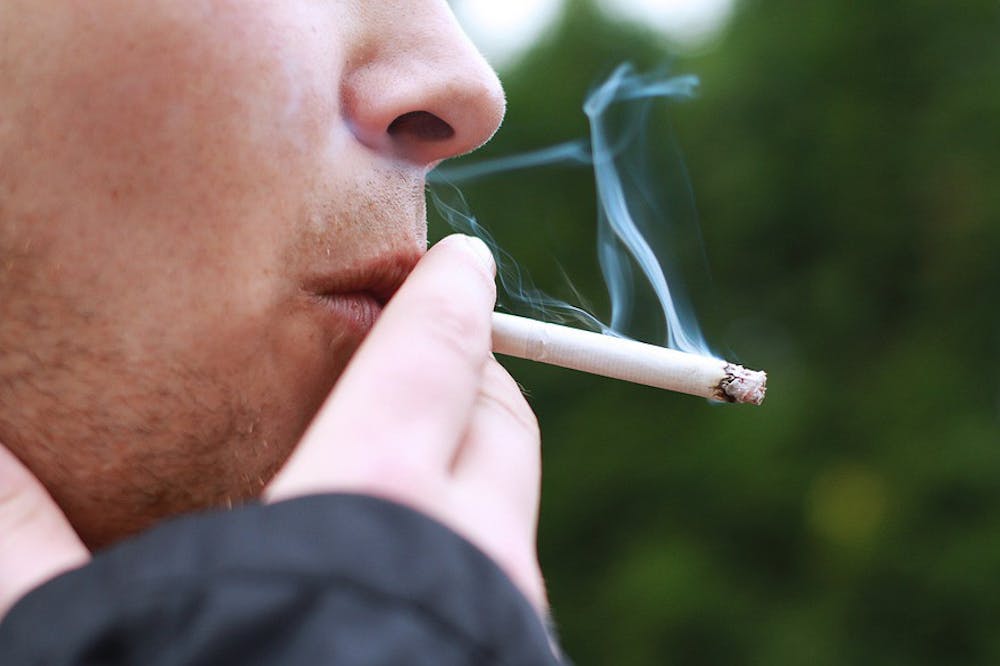
Penn administrators are looking to find a balance between promoting healthy behavior and not alienating students that smoke | Courtesy of Pixabay
Even though a full one-third of college students nationwide use tobacco products, according to a study from the Harvard School of Public Health, Penn administrators have effectively tried to stamp out smoking for good. But not all students are on board.
The conversation among administrators to make Penn a tobacco-free campus started as early as 2013. A task force led by pulmonologist Frank Leone, director of Penn’s Comprehensive Smoking Treatment Program, has been working with faculty and students alike to promote a “tobacco-less culture” on campus.
The initiative wasn't only supported by administrators. 2014 College and Fels Institute of Government graduate Dan Bernick, a former Undergraduate Assembly president, played an essential role as a student advocate on Leone’s task force. And Ashlee Halbritter, director of Campus Health Initiatives, cited student involvement as a critical component of the project’s progress.
As of this spring, the initiative has spearheaded several changes — human resources updated its tobacco policy to include outdoor spaces as tobacco-free spaces, a change that was made official by the Board of Trustees this past fall.
Student Health Service also recently opened its smoking cessation counseling, which is free and unlimited for students who want to cut back on or stop their smoking practices. A small but important change included adding additional signage around edges of campus where visitors might see that campus is tobacco-free. SHS will use results from the National College Health Assessment Survey — a survey sent out to a random array of students every two years and is being completed now — to see how much the attitude toward smoking has changed.
For now, administrators are most concerned about making sure that their promotion of tobacco-less culture does not alienate them from students. Leone said he wants students to feel respected while Penn shifts towards smoking cessation.
“It remains to be seen whether we will be successful walking this fine line," he said. “But the overall strategy tries to find a balance between creating motivators to avoid the smoking behavior without creating reasons to scorn or somehow shame the people who display this behavior.”
Students have had varied reactions to Penn’s philosophical shift on tobacco use.
A Wharton and College freshman, who preferred to remain anonymous because she did not want her family and friends to think that she supports smoking, said she believes Penn’s stance will isolate students from the realities of the greater world — where people are not prevented from smoking in all open spaces.
“While I understand that students may not enjoy the smell of smoke, Penn is supposed to prepare us for the real world, not shelter us from it”, she said. “By enforcing this policy, Penn is further enforcing the ‘Penn bubble.’ Also, I rarely see or smell enough students smoking on campus that I would be worried about secondhand smoking."
A junior in the College who lost his father to lung cancer thinks that Penn’s stance can prevent students from developing a life-shortening addiction. He preferred to remain anonymous because he is not comfortable discussing his father's death publicly.
“My dad started smoking in college as a thing to do at parties and then between classes," he said. “If the tobacco-free culture keeps even one student from starting up on the habit, I think it will have been well worth it."
The Daily Pennsylvanian is an independent, student-run newspaper. Please consider making a donation to support the coverage that shapes the University. Your generosity ensures a future of strong journalism at Penn.
DonatePlease note All comments are eligible for publication in The Daily Pennsylvanian.







